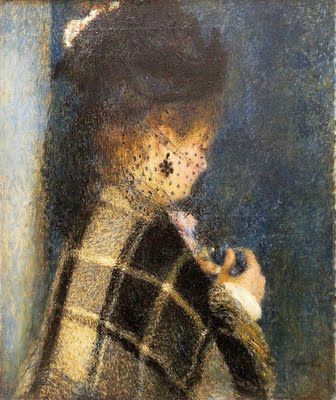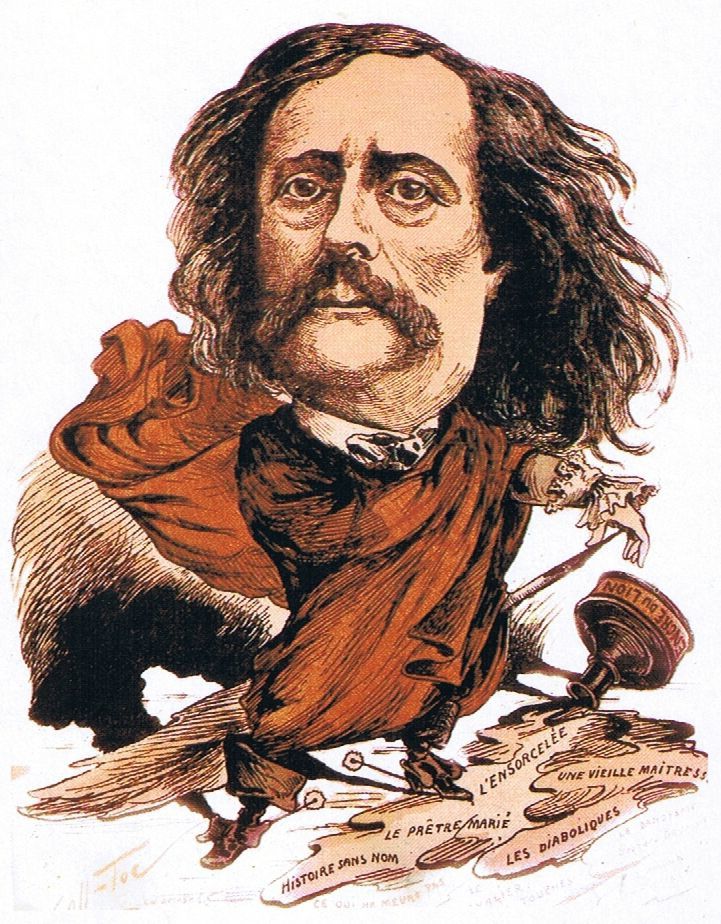Le bonheur dans le crime (part 4)
 Wednesday, February 29, 2012 at 17:20
Wednesday, February 29, 2012 at 17:20 Part four of a story ("The happiness in crime") by this French writer. You can read the original here.

 "Oh they were hard, all these losses! And there were so many reasons to recur to the memory of that irreproachable Hauteclaire, a more or less muddy torrent of supposition! And these reasons all arose. Apart from a few high-and-mighty country squires who, like her godfather, the Count of Avice, had seen the child and who, in any case, were not moved by much, most people simply determined she had found a better shoe to fit her foot than the fencing master sandal with which she was once shod. Hauteclaire Stassin, in disappearing, had no one to call her own. She had offended everyone’s self-esteem; and young people held the greater grudge and were more roused against her because she had not run away with any of them.
"Oh they were hard, all these losses! And there were so many reasons to recur to the memory of that irreproachable Hauteclaire, a more or less muddy torrent of supposition! And these reasons all arose. Apart from a few high-and-mighty country squires who, like her godfather, the Count of Avice, had seen the child and who, in any case, were not moved by much, most people simply determined she had found a better shoe to fit her foot than the fencing master sandal with which she was once shod. Hauteclaire Stassin, in disappearing, had no one to call her own. She had offended everyone’s self-esteem; and young people held the greater grudge and were more roused against her because she had not run away with any of them.
"And for a long time this was their great grievance and anxiety. With whom had she run away? Many of these young people would spend a month or two of winter every year in Paris, and two or three of them claimed there to have seen and recognized her – on stage in a show or on horseback on the Champs-Elysées. She was ‘seen’ both alone and accompanied – but they couldn’t be sure. Nothing could be confirmed. She was the one and yet could very well not have been; but the preoccupation persisted. No one could refrain from thinking about this girl whom they had once admired and who, by disappearing, had forced this fencing town into mourning – this town for which she had been a great artist, a diva, a ray of light. Once the ray was extinguished, that is to say, in other words, after the disappearance of this famous Hauteclaire, the city of V. fell in the languor of life and the dimness of all the small towns that do not have a center of activity in which passions and tastes converge. Its love for fencing weakened. Formerly roused by all this martial youth, the city of V. became sad. Young people who when they lived in their castles would come every day to clank iron, exchanged the foil for the rifle. They became hunters and remained on their land or in their woods, the Count of Savigny acting no differently than all the others. He would come less and less often to V. And if I did happen to run into him on occasion, it was with the family of his wife, for whom I was the doctor. Not suspecting at this time that there could be something between him and this Hauteclaire who had disappeared so abruptly, I had no reason to talk about this sudden disappearance, on which silence, the progeny of tired tongues, began to expand. Nor did he ever speak to me about Hauteclaire and the times we would see one another at her fencing hall. In fact, he refused to make the slightest reference to these times, even indirectly."
"I can see this coming from a mile away," I said to the doctor, using a local expression from my own region, which happened to be the same region the doctor was talking about. "It was he who had spirited her away!"
"Well, actually not at all," said the doctor. "It was better than that! You will never suspect what it was …"
"What is more – in the provinces, especially – any abduction would not have been easy considering one secret: that the Count of Savigny, since his marriage, had not moved from Savigny castle. He lived there, to the knowledge of everyone, in the intimacy of a marriage which resembled an indefinitely prolonged honeymoon. And as everything is cited and rated in the provinces, Savigny was both cited and rated as one of those husbands so rare as to be burned (a joke in the provinces), whose ash was then to be scattered on others. God knows how long I myself would have been fooled by this reputation, if, one day – more than a year after the disappearance of Hauteclaire Stassin – I hadn’t been urgently summoned to the castle of Savigny, whose lady was ill. I left immediately, and, upon my arrival, I was introduced to the Countess, who was indeed suffering from a very vague and complicated ailment, more dangerous than a severely characterized disease. She was one of those women of the old breed – jaded, elegant, distinguished, haughty – who, from the bottom of their pallor and their emaciation, seem to say: 'I have overcome time, just as my breed has; I am dying, but I despise you!' And deuce take it, as plebeian as I am, and although such a sentiment is only faintly philosophical, I cannot help but find it beautiful.
"The Countess was lying on a daybed in a type of parlor with black girders and white walls, very large, very high, and decorated in ancient art pieces which did the highest honor to the taste of the counts of Savigny. A single lamp illuminated this large room, and its light, made more mysterious by the green lampshade which veiled it, fell on the face of the Countess and her cheeks aflame with fever. She had been sick for a few days already and Savigny, to watch over her better, had had a small bed placed in the parlor next to the bed of his beloved better half. This was when the fever, more tenacious than all his attempts at care and healing, had shown a determination on which he had not counted and he had decided to send for me. He was standing there, his back to the fire, with a concerned and somber air to make me believe that he passionately loved his wife and that he believed her to be in danger. But the concern that burdened his brow was not for her, but for another, someone I did not suspect in the castle of Savigny, and whose sight simply dazzled me. It was for Hauteclaire!"
"The Devil take it!" I said to the doctor. "That is daring!"
"So daring," he said, "that when I saw her, I thought I was dreaming! The Countess had asked her husband to ring for her lady in waiting, from whom she had requested, prior to my arrival, a potion that I had specifically come to prescribe for her. And, seconds later, the door was opened:
"'And my potion, Eulalie?' said the impatient Countess with a curt tone.
"'Here you are, Madam!' said a voice that I thought I recognized, and which had no sooner hit my ear than I saw emerge from the shadows drowning the deep edge of the parlor and move forward onto the light circle traced by the lamp on the bed none other than Hauteclaire Stassin – yes, Hauteclaire herself! She was holding in her beautiful hands a silver platter on which sat the steaming bowl requested by the Countess. Such a view was enough to take your breath away! Eulalie! Fortunately, this name of Eulalie pronounced so naturally told me everything. And it was like the blow of an ice hammer which made me return to a presence of mind that I otherwise was going to lose, to my passive attitude as doctor and observer. Hauteclaire had become Eulalie and the lady in waiting to the Countess of Savigny! Her disguise – if such a woman could really disguise herself – was complete. She was wearing the costume of the female laborers of the town of V., and their hairstyle which resembled a helmet, and long curls falling upon her cheeks, those curls which preachers at that time called snakes to put people off the pretty girls, without ever having been able to do so successfully. Beneath this disguise she was of a beauty full of reserve, and a nobility of lowered eyes which proved that they did whatever they wanted to do with their damned body, these female vipers, whenever the slightest interest struck them. Having caught on to the rest of it and being sure of myself as a man who had to bite his tongue not to let out a cry of surprise, I nevertheless felt a small weakness: to show this bold girl that I recognized her. And so, as the Countess drank her potion, her forehead in her bowl, I fixed my two eyes on her eyes, as if I had pressed two sticky tabs upon them. But she had just lowered her eyes. Her eyes – that evening, like those of a doe in their softness – were firmer that those of the panther. She did not raise her eyebrows. A small earthquake, almost imperceptible, had only passed in the hands that took the tray. The Countess was drinking very slowly, and when she was finished:
"'That’s fine,' she said. 'Take this back.'
"And Hauteclaire-Eulalie turned; and with this turn I would have recognized her among the twenty thousand turns of the daughters of Ahasuerus, and she took back the tray. I confess that I sat a moment without looking at the Count of Savigny because I sensed what my eyes could be for him at such a moment. Yet when I risked a glance, I found all the power of his own stare pinned upon me, and his look passed from that of the most horrible anxiety to an expression of deliverance. He had just seen that I had seen, but he also saw that I didn't want to see anything of what I had seen, and he breathed in again. He was sure of impenetrable discretion that he would probably explain (but I couldn’t have cared less!) by the interest of the physician who was not keen on losing a patron like him. When, in truth, there was nothing there but the interest of the observer who did not wish to have closed upon himself the door of a house in which – unbeknownst to all the Earth – there were such things to observe.





